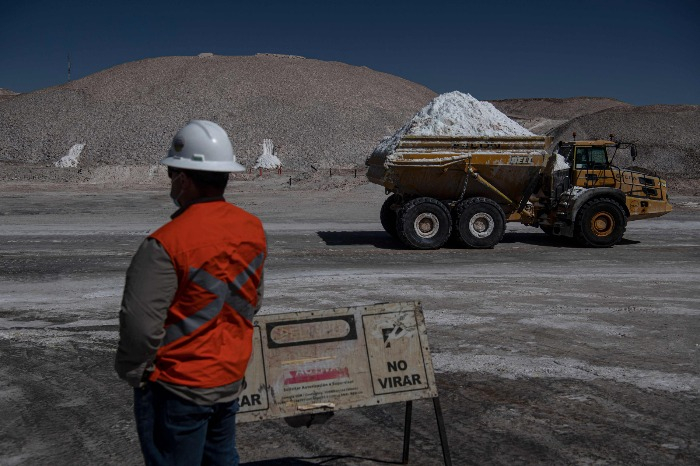Supply chain
KITA sees exponential jump in demand for key minerals within 20 years
The trade body urges a strategy for more stable supply chains like diversification
By Dec 09, 2022 (Gmt+09:00)
2
Min read
Most Read
LG Chem to sell water filter business to Glenwood PE for $692 million


KT&G eyes overseas M&A after rejecting activist fund's offer


Mirae Asset to be named Korea Post’s core real estate fund operator


StockX in merger talks with Naver’s online reseller Kream


Meritz backs half of ex-manager’s $210 mn hedge fund



Amid the global supply chain crisis and growing trade protectionism by major economies, a study by a major trade body in South Korea says the nation needs a strategy for the stable supply of core minerals.
In the report "Strategies and Implications of Securing Core Minerals in Major Countries", the Korea International Trade Association (KITA) on Thursday said demand for major minerals including lithium and rare earth metals is expected to see exponential growth over the next 20 years.
Surging demand for such minerals stems from the efforts of major economies like the US, European Union (EU) and China to replace fossil fuels with eco-friendly energy sources, the report added, with nations going all out to secure minerals crucial for renewable energy and power generation like raw materials for batteries and rare earth metals. Such minerals are essential for the mobility sector such as electric vehicles and batteries and eco-friendly energy sources such as solar power.
Key minerals are often concentrated in certain countries, the report said, and the rise of resource nationalism will intensify global competition to secure these resources.
The US is promoting stabilization of its mineral supply chains by raising domestic output capacity and pursuing supply chains with its allies, or "friendshoring," to alleviate its heavy dependence on China for key minerals.
For example, the US Infrastructure Investment and Jobs Act includes support from the Department of Energy of over $7 billion over five years for technological development related to key minerals, expanded output and manufacturing of battery components. In the same vein, Korea is discussing international cooperation for stable supply and demand of such minerals through consultative bodies like the four-country Quadrilateral Security Dialogue and the 10-nation Minerals Security Partnership.
The EU is also launching pan-continental organizations such as the European Battery Union and European Raw Materials Association to diversify suppliers by boosting domestic mineral production and expanding overseas cooperation in the sector.
China, with one of the world's largest reserves of core minerals, is raising its presence on the global minerals market by boosting control of its domestic resources and aggressively securing resources abroad. The country merged its rare earth companies with public businesses and has banned foreign investment, exploration and mining of key minerals in China such as tungsten. Chinese investment of $86.2 billion from 2013-18 went in overseas mining projects and M&As.
"Korea is dependent on imports for most core minerals such as nickel, lithium and rare earth metals, so a strategy for the stable supply of such minerals is needed," senior KITA research Park Ga-hyun said. "We must actively diversify our supply chains through more resource development abroad and related support, expansion of technological development such as recycling and use of waste resources, CO2 reduction and alternative technology, and talks on forming supply chains with allies."
Write to Ji-Hoon Lee at lizi@hankyung.com
More to Read
-
 Supply chainKorean manufacturers’ dependence on China intensifies
Supply chainKorean manufacturers’ dependence on China intensifiesJul 11, 2022 (Gmt+09:00)
3 Min read -
 BatteriesFalling nickel prices: A boon for Korean battery makers over Chinese rivals
BatteriesFalling nickel prices: A boon for Korean battery makers over Chinese rivalsJun 21, 2022 (Gmt+09:00)
3 Min read -
 AutomobilesHyundai Motor, battery firms strive to limit China lockdown disruptions
AutomobilesHyundai Motor, battery firms strive to limit China lockdown disruptionsMay 02, 2022 (Gmt+09:00)
3 Min read -
 BatteriesKorea battery makers at risk from reliance on China materials
BatteriesKorea battery makers at risk from reliance on China materialsFeb 16, 2022 (Gmt+09:00)
2 Min read -
 BatteriesChina’s tighter grip on supply chain hurts Korean battery makers
BatteriesChina’s tighter grip on supply chain hurts Korean battery makersDec 27, 2021 (Gmt+09:00)
4 Min read
Comment 0
LOG IN


